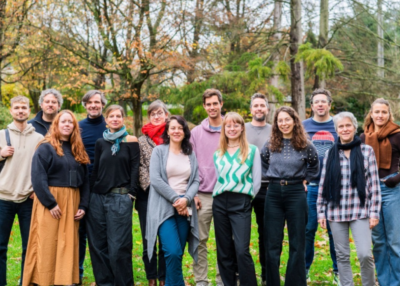
Female entrepreneurship on the rise in Brussels
Female entrepreneurship is on the rise in Brussels: one woman out of 10 is self-employed, i.e. the highest rate in Belgium. This was the finding of the 2019 edition of the bi-annual barometer of Women in Business, the website for female entrepreneurship in Brussels hosted by hub.brussels.
The number of self-employed women increased by 30% in 10 years in the Brussels Region and the number of part-time self-employed grew by more than 50%. One of the reasons for this upward trend is the involvement of business cooperatives which work to encourage women who are looking for work to consider entrepreneurship risk-free.
However, despite the progress made thanks to the measures implemented by the Region, the rate of NEET women (Not in Education, employment & training) remains too high.
One woman out of 10 is full-time self-employed
The 2018 figures are particularly significant. That year, 52% of women between 15 and 64 were employed, an increase of nearly two percentage points compared to the previous year. This annual growth was the strongest in the past ten years and contributed to a significant reduction in the rate of female unemployment (-1.7 percentage points).
In 2018 also, over 27,000 women under 65, i.e. 10% of female Brussels residents in employment, paid self-employment social security. The number of self-employed women in the Brussels Region increased by 30% over 10 years and the number of part-time self-employed increased by over 50%.
The increase is reflected in the figures for the European total entrepreneurial activity rate of women (TEA). While Belgium was at the back of the pack of the 28 EU members with a TEA of 3.1, i.e. the lowest rate in the Union, the latest study done in 2015 shows that our country recorded a substantial increase in the number of self-employed women, enabling it to reach a TEA of 5 and lift itself to the 14th position, tied with Hungary and Spain.
According to Barbara Trachte, Secretary of State for the Economic Transition:
This encouraging increase in female entrepreneurship in Brussels needs to be highlighted. Although they are still proportionally less numerous than men, self-employed women are leading more and more innovative projects in Brussels’ ecosystem. We have to continue to encourage them to launch new projects while making them aware of the pitfalls to be avoided. It is also essential that support for women entrepreneurs be further strengthened. That’s the purpose of our action within the government and of the work done by the Women in Business platform.
The key role of business cooperatives
The creation of business cooperatives in Brussels has made a clear contribution to the growth over the past decade. They provide a structured and secure framework to safely develop an entrepreneurial project and test it in the marketplace.
Senrei Wu, creator of BoucheB, a vegetable butcher shop in the Tanneurs district notes that:
Thanks to JobYourself, I was able to focus on developing my project without taking any financial risks. I don’t think I would have become an entrepreneur if I had been alone. What I really liked was that I had the opportunity to test my concept for 18 months, get my first customers and challenge my decisions with advisers and coaches before going out on my own.
According to Isabelle Grippa, director general of hub.brussels, the risks are in fact a major stumbling block for women thinking of becoming entrepreneurs:
Women also want advice and support. The business cooperatives meet their expectations perfectly in this respect. This model is even more important during times of crisis because it brings the entrepreneur out of isolation. Each situation is unique and the Women in Business platform helps women find the support structure best suited to their needs.
According to Jean-Olivier Collinet, director of JobYourself, there are many different types of support available in the Brussels Region to help women take the first step. And even though it may not result in the creation of a company, having entrepreneurial experience makes it easier to find a job.
The rate of NEET women is still too high
While the number of women entrepreneurs is increasing, one figure continues to be too high: the rate of NEET (Not in education, employment & training) women. In 2018, 26% of women between the ages of 15 to 64 were neither employed or on unemployment or were students, whereas the rate for men was only 15%.
According to Loubna Azghoud, responsible for the Women in Business platform:
The typical NEET is a woman! The 26% “female NEET” rate shouldn’t leave anyone indifferent. It reveals that women in Brussels don’t have the same economic opportunities.
In Belgium, the difference between young NEET men and young NEET women is blatant. The difference is 6% for NEET women between the ages of 25 and 29 and even higher, at 8.6%, for women between the ages of 30 and 34. These are the prime child bearing years when women take care for young children.
The barometer also reveals a disparity between the municipalities in the north and south of Brussels. In Uccle, the share of self-employed women is 12.9% (the highest in Brussels) whereas the rate drops to 3.8% in Molenbeek-Saint-Jean.
At Women in Business, these numbers encourage us to increase our activity in the northern section of Brussels.
The impact of the COVID-19 crisis
The barometer of female entrepreneurship in the Brussels Region also shows that nearly a quarter of self-employed women in Brussels work in the retail and hospitality sectors, which have been very hard hit by the COVID-19 crisis. It’s important to measure the consequences on the activity of women entrepreneurs in Brussels.
An impact study of the current difficulties, pitfalls and specific needs of women entrepreneurs in Brussels will be carried out in the coming weeks.
For Isabelle Grippa, director general of hub.brussels,
Understanding the ways in which women are more heavily impacted than men by the unprecedented crisis will enable adjustments to be made to the actions carried out by hub.brussels to support this more economically vulnerable group. All aspiring entrepreneurs, entrepreneurs and starters need to find answers to their questions in Brussels. Four emergency units were set up at hub.brussels at the start of the crisis with the mobilisation of 130 volunteers and the deployment of tools. The study will help to strengthen the system and to adapt the content for women.
Key 2019 barometer figures
- 35:a majority of women (57.3%) who become self employed are under 35
- 66: two-thirds of the self-employed (66%) have a higher education diploma
- 3.8: Molenbeek-Saint-Jean has the lowest rate of self-employed women in the Brussels-Capital Region (3.8%). Woluwe-Saint-Pierre, Watermael-Boitsfort and Uccle have the highest rates, at close to 10% to 13%
- 31.7: the Brussels-Capital Region has proportionally four to five times more foreign self-employed (31.7%) than the other regions
- 92: in five years, the share of women on the board of directors of listed companies has jumped by 92%, increasing from 16.7% to 32%. While Belgium was in 12th place in Europe (EU-28) in 2013, it was in 6th place in 2018
- 50,000: 8.7% of Brussels’ self-employed have an income over €50,000 a year. At the highest income levels, starting at €30,000, there are proportionally more self-employed women than men.
Want to learn more about Women in Business? Contact Audrey!

Audrey Kamali
Attachée sensibilisation entrepreneuriat féminin akamali@hub.brusselsMore news on our blog

After Audi: Brussels foreign trade in the first half of 2025
Posted on 28/01/2026
